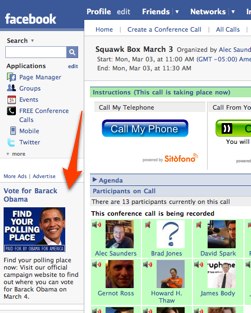It’s not very often at all that I say that there is something out that I think that people really “must read“. In fact, the last thing I can really thing of that I recommended this strongly was The Cluetrain Manifesto, but that was back in 2000!
 So I find myself a bit surprised to be making that recommendation for a piece in that most mainstream of all business publications, The Economist…. but in my opinion it really is a series of articles that people should read, contemplate, and talk about.
So I find myself a bit surprised to be making that recommendation for a piece in that most mainstream of all business publications, The Economist…. but in my opinion it really is a series of articles that people should read, contemplate, and talk about.
The Special Report, titled “The New Nomadism“, looks at the changes happening in our society as we arrive at this fascinating intersection where we have incredible amounts of network bandwidth available wherever we are – and smaller more powerful devices that can take advantage of that bandwidth. When we can work wherever we want, whenever we want, what does that mean for our society? for our work environment? for our work/life balance? for our communities?
The piece has 7 main articles, several of which go on for several screens:
(FYI, the Economist has made this report available for purchase if you would like it in print form.)
There is also an introductory piece, “Our Nomadic Future“, which is also worth a read.
All together the pieces ask some of the excellent questions that I think we need to be thinking about. I intend to write some further thoughts in the days and weeks ahead. We also discussed this whole piece at some length on the April 16th Squawk Box podcast and it was something I covered in my report into yesterday’s For Immediate Release podcast.
Here’s a taste of the first article in the series:
Urban nomads have started appearing only in the past few years. Like their antecedents in the desert, they are defined not by what they carry but by what they leave behind, knowing that the environment will provide it. Thus, Bedouins do not carry their own water, because they know where the oases are. Modern nomads carry almost no paper because they access their documents on their laptop computers, mobile phones or online. Increasingly, they don’t even bring laptops. Many engineers at Google, the leading internet company and a magnet for nomads, travel with only a BlackBerry, iPhone or other “smart phone”. If ever the need arises for a large keyboard and some earnest typing, they sit down in front of the nearest available computer anywhere in the world, open its web browser and access all their documents online.
Another big misunderstanding of previous decades was to confuse nomadism with migration or travel. As the costs of (stationary) telecommunications plummeted, it became fascinating to contemplate “the death of distance” (the title of a book written by Frances Cairncross, then on the staff of The Economist). And since the early mobile phones were aimed largely at business executives, it was assumed that nomadism was about corporate travel in particular. And indeed many nomads are frequent flyers, for example, which is why airlines such as JetBlue, American Airlines and Continental Airlines are now introducing in-flight Wi-Fi. But although nomadism and travel can coincide, they need not.
Humans have always migrated and travelled, without necessarily living nomadic lives. The nomadism now emerging is different from, and involves much more than, merely making journeys. A modern nomad is as likely to be a teenager in Oslo, Tokyo or suburban America as a jet-setting chief executive. He or she may never have left his or her city, stepped into an aeroplane or changed address. Indeed, how far he moves is completely irrelevant. Even if an urban nomad confines himself to a small perimeter, he nonetheless has a new and surprisingly different relationship to time, to place and to other people. “Permanent connectivity, not motion, is the critical thing,” says Manuel Castells, a sociologist at the Annenberg School for Communication, a part of the University of Southern California, Los Angeles.
This is why a new breed of observers is now joining the ever-present futurists and gadget geeks in studying the consequences of this technology. Sociologists in particular are trying to figure out how mobile communications are changing interactions between people. Nomadism, most believe, tends to bring people who are already close, such as family members, even closer. But it may do so at the expense of their attentiveness towards strangers encountered physically (rather than virtually) in daily life. That has implications for society at large.
Anthropologists and psychologists are investigating how mobile and virtual interaction spices up or challenges physical and offline chemistry, and whether it makes young people in particular more autonomous or more dependent. Architects, property developers and urban planners are changing their thinking about buildings and cities to accommodate the new habits of the nomads that dwell in them. Activists are trying to piggyback on the ubiquity of nomadic tools to improve the world, even as they worry about the same tools in the hands of the malicious. Linguists are chronicling how nomadic communication changes language itself, and thus thought.
Beyond technology
This special report, in presupposing that a wireless world will soon be upon us, will explore these ramifications of mobile technology, rather than the technologies themselves or their business models. But it is worth making clear that technology underlies all of the changes in today’s nomadic societies, so that its march will accelerate them. Wireless data connections, in particular, seem to be getting better all the time. Cellular networks will become faster and more reliable. Short-range Wi-Fi hotspots are popping up in ever more places. And a new generation of wireless technologies is already poised to take over. Regulators have grasped that the airwaves are now among society’s most important assets. America, for instance, has just auctioned off a chunk of spectrum with new rules that require the owner to allow any kind of device and software to run on the resulting network.
Cumulatively, all of these changes amount to a historic merger, at long last, of two technologies that have already proved revolutionary in their own right. The mobile phone has changed the world by becoming ubiquitous in rich and poor countries alike. The internet has mostly touched rich countries, and rich people in poor countries, but has already changed the way people shop, bank, listen to music, read news and socialise. Now the mobile phone is on course to replace the PC as the primary device for getting online. According to the International Telecommunication Union, 3.3 billion people, more than half the world’s population, now subscribe to a mobile-phone service (see chart 1), so the internet at last looks set to change the whole world.
<snip>
The most wonderful thing about mobile technology today is that consumers can increasingly forget about how it works and simply take advantage of it. As Ms Canlas sips her Americano and dives into her e-mail in-box at the Nomad Café, she gives no thought to the specifications and standards that make her connection possible. It is the human connections that now take over.
It is truly a fascinating time that we live in right now, and kudos to the Economist for a strong piece that looks at the larger societal implications of all these changes.
What do you think of all these changes going on?
Technorati Tags:
economist, nomadism, internet, culture, society, mobility
 On today’s Squawk Box conference call/podcast at 11am US Eastern, we’ll talk about Nick Carr’s essay in the Atlantic Monthly called “Is Google Making Us Stupid?”
On today’s Squawk Box conference call/podcast at 11am US Eastern, we’ll talk about Nick Carr’s essay in the Atlantic Monthly called “Is Google Making Us Stupid?” So I find myself a bit surprised to be making that recommendation for a piece in that most mainstream of all business publications,
So I find myself a bit surprised to be making that recommendation for a piece in that most mainstream of all business publications, 
 However, when I have several blog posts across multiple blogs, the algorithm to collect the data for the friendfeed seems to take the name of the first blog in the title. For instance, as shown in the image to the right, it says “posted three blog posts on Voice of VOIPSA” but in fact only the first post was in “
However, when I have several blog posts across multiple blogs, the algorithm to collect the data for the friendfeed seems to take the name of the first blog in the title. For instance, as shown in the image to the right, it says “posted three blog posts on Voice of VOIPSA” but in fact only the first post was in “
 Given that the presidential primary here in Vermont is happening tomorrow[1], we’ve naturally been subjected to a heavy dosage of advertising in all mass media. I was, though, rather amused to see ads for Sen. Barack Obama appearing on my Facebook page when I was visiting the site today (see image to right). I haven’t seen any ads for Sen. Hillary Clinton, but perhaps this is because, according to TechPresident.com,
Given that the presidential primary here in Vermont is happening tomorrow[1], we’ve naturally been subjected to a heavy dosage of advertising in all mass media. I was, though, rather amused to see ads for Sen. Barack Obama appearing on my Facebook page when I was visiting the site today (see image to right). I haven’t seen any ads for Sen. Hillary Clinton, but perhaps this is because, according to TechPresident.com,  Chris Brogan yesterday released a free eBook “
Chris Brogan yesterday released a free eBook “